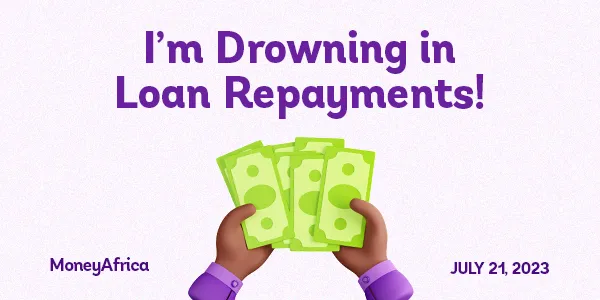Good Morning 😃
How are you doing?
Friday letters are usually dedicated to taking questions from our community. Do you have a question for us?
Please feel free to:
- send an e-mail to info@themoneyafrica.com; or
- send a DM to any of our social media channels, or
- simply fill out this form. Don’t worry, your responses are kept anonymous.

Don’t miss this week’s FREE Masterclass. Sign up here.
***
Question
I recently started budgeting and I have been seeing so many holes in how I have been spending money. My rent being 80% of my income is one of them. My area is a high-net-worth place and I never knew that my rent and light bills took that much from my income. Do I focus my energy on increasing my income or looking for cheaper housing? Keep in mind that this same environment is one of the major factors I started earning that high in the first place.
Answer
It’s great to hear that you’ve started budgeting and are taking a closer look at your expenses. It can be eye-opening to realise how much of your income is going towards rent and bills. Finding the right balance is essential for financial stability. There is a general rule of thumb that your rent should not be more than 30% of your monthly income. That is a very important factor to take note of so you don’t end up straining yourself financially.
When it comes to addressing the issue, there are a few things to consider.
- First, take a step back and evaluate your overall financial situation. Look at your income, expenses, and savings goals. This will help you understand the bigger picture and identify areas where you can make adjustments.
- Increasing your income might seem like an appealing option, especially if your high-net-worth area provides opportunities for growth. Take some time to explore ways to boost your income. Are there chances for a raise or a promotion at your current job? Could you take on additional part-time work or invest in developing new skills that could lead to higher-paying opportunities? Assessing these possibilities can give you a clearer idea of what’s feasible.
- On the other hand, exploring cheaper housing options could also be a viable solution. Moving to a more affordable place or downsizing to a smaller apartment could significantly reduce your monthly expenses. You might even consider finding roommates to share the costs or looking at neighbouring areas where rent prices are lower.
- It’s important to weigh the pros and cons of each option carefully. Increasing your income might provide immediate relief and allow you to maintain your current lifestyle. However, finding cheaper housing could have a more substantial long-term impact on your financial well-being, freeing up more money for savings and other financial goals.
***
Question
I am devastated and I don’t know what to do. Last year, I took out some loans via a loan app to sort out a family emergency. Unfortunately, I couldn’t get the money I was expecting to enable me to pay back the loan I collected from two other apps. It’s a year now and I am still going round that circle. The interest is high. I have even used part of my salary. Right now, I don’t know what to do again.
Answer
We sympathise with you on this and we understand that you’re going through such a tough situation with your loans. It must be incredibly frustrating and overwhelming to be stuck in a cycle of borrowing and struggling to make progress.
- Assess your financial situation. When faced with high-interest loans, it’s important to take a step back and assess your current financial situation. Understanding the full extent of your debts, income, and expenses will give you a clearer picture of what you’re dealing with.
- Negotiate with the loan companies. Have you tried reaching out to the loan apps you borrowed from? It might be worth explaining your situation to them and seeing if there is an option for an alternative repayment plan or revised terms. Some lenders are willing to work with borrowers who are facing difficulties, so it’s worth exploring that possibility. Also, after reaching out to the loan companies, you should prioritise paying back the loan before saving and investing. We advise you to set aside money for emergencies after you’re able to come out of this cycle of debt.
- Have a repayment plan or strategy. Creating a repayment plan can also help you regain control over your finances. Prioritise your debts based on interest rates and repayment terms. Focus on tackling the loans with the highest interest rates first while making minimum payments on the others. It might be challenging, but allocating as much as you can towards debt repayment each month can gradually chip away at the balance. Please note that borrowing to pay back the loan is not a good idea, especially when it is a high-interest loan.
- Seek financial advice. Seeking guidance from a financial professional, such as a credit counsellor, could provide valuable insights. They can offer personalised advice based on your specific circumstances and help you navigate the best course of action. They may also be able to negotiate with lenders on your behalf and provide strategies for regaining financial stability.
***

We want you to navigate through the second half of the year by making calculated moves. For this reason, we are hosting another FREE masterclass to help you get your money right.
Join us this Saturday at 10am (WAT)
***
Would you like to know the state of your finances?
Take this test to see how you are doing financially
***
Do you know that we have our own podcast? It’s MONEYTALKS!💚
Here’s a link to listen to all the amazing episodes we have!
***
Thank you for reading Money Africa’s Blog.
Please feel free to share it.
MoneyAfrica premium plan
Are you a mid to high-income earner? Do you find communities a bit too busy? You should sign up for our premium plan.

You can learn more about that here.
***
We often get questions regarding how to plan your finances to align with your relocation plans, especially for students seeking to further their studies. As always, we have heard you, and we have put together an e-book to help you navigate this. Follow this link, to get your FREE copy of the e-book: The Japa Encyclopedia.
***
Get our annual subscription and learn more about investing safely and building a solid portfolio in 2023.
Don’t forget to:
- Join our community, if you want to smash your 2023 financial goals. It takes at least 30 days to build great habits that will last you a lifetime. So why not start now? There is a lot you can achieve.
- If you would like to document your financial journey in 2023, then our journal would be an excellent fit for you. It costs ₦7,500 (excluding delivery).
- Get a budget sheet to track your monthly expenses. Click here
- Get an investment tracker to be on top of all your investments. Click here
MoneyAfrica is a financial literacy platform. Our goal is to make everyone better with their finances.
We do this by engagements via our:
– social media handles
– platforms for paid community members (for adults and students)
– webinar sessions with corporate clients
Would you like to join any of the communities? Please click here
Would you like us to hold a webinar for your company’s staff? Please send an email to info@themoneyafrica.com


